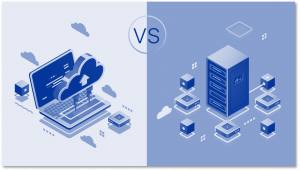When it comes to managing physical security for your business, there are two basic approaches: cloud security systems vs. on-premise solutions.
An on-premise solution is housed in a physical location – generally in the same building as the security systems. Recorders or on-premise servers capture and store data from security cameras, access control systems, sensors and alarms transmitted over an internal network. Security professionals can review and analyze the data on monitors on the premises.
Cloud security systems, on the other hand, capture and store sensitive data from the same security sources, but house them in a secure data center in the cloud. The data is transmitted over the Internet. Security teams can access the data via the Internet and review it on a variety of fixed and mobile devices, either on the premises or remotely.
Here are some key differences between the two:
Infrastructure
Key Difference - Location of Infrastructure.
If space is at a premium, a cloud solution can free space on the premises for other uses. This may be important in a smaller building or in a retail outlet, apartment or office complex where the space can be used to generate additional revenue.
Management/Maintenance
Key Difference - requirement for staff with the skills and available time to manage and maintain the infrastructure and internal networks.
For a business with a small IT team, the support burden can distract them from other important tasks.
Connectivity
Connectivity is an important consideration in the cloud vs. on-premise security decision. Security professionals should carefully compare network performance, degree of security and other internal networking requirements as part of the decision process.
Storage Capacity
This part of the decision is determined by the capacity required for current and future needs. Security teams using on-premise storage choose between deleting data or adding new capacity. Cloud-based systems offer other options for expansion. The important thing to keep in mind when comparing storage for cloud vs. on-premises security is that you have a way to access vital evidence and data later if incidents do arise.
Reliability
When comparing the reliability, it’s important to take into account responsibility for maintaining reliability. On-premise solutions offer greater control over uptime, but they rely on the maintenance capability and responsiveness of in-house support teams. Cloud system reliability is dependent on factors outside the control of the in-house team.
Disaster Recovery
Where data is stored in the cloud, a disaster on the business premises will not result in a loss of service or access to stored data, although any damage to key cameras such as security cameras in retail stores or other security devices would disrupt current feeds. The cloud infrastructure is not affected by local issues and security staff can access cloud data on internet-connected mobile devices from any location to continue monitoring security.
Control/Compliance
This may be necessary to protect different types of sensitive information subject to industry regulations or client contractual requirements. Storing data in the cloud may not be permissible under those regulations or contractual requirements, so it is essential to check that the storage solution is compliant. In some cases, a hybrid solution may be the right option, with compliant data stored on-premise and other data sent to the cloud.
Security Monitoring
With the cloud, security teams can access security feeds and stored data from any location using an Internet-connected device. This increases operational flexibility and means that businesses do not have to retain staff on-site outside normal business hours.
Cloud storage also improves mobility for security teams; they can attend incidents while receiving up-to-date camera feeds and other information that can help them resolve incidents more effectively. Businesses with multiple sites can centralize monitoring operations with feeds from all sites stored in the cloud and accessible from a central monitoring post or from any convenient location.



